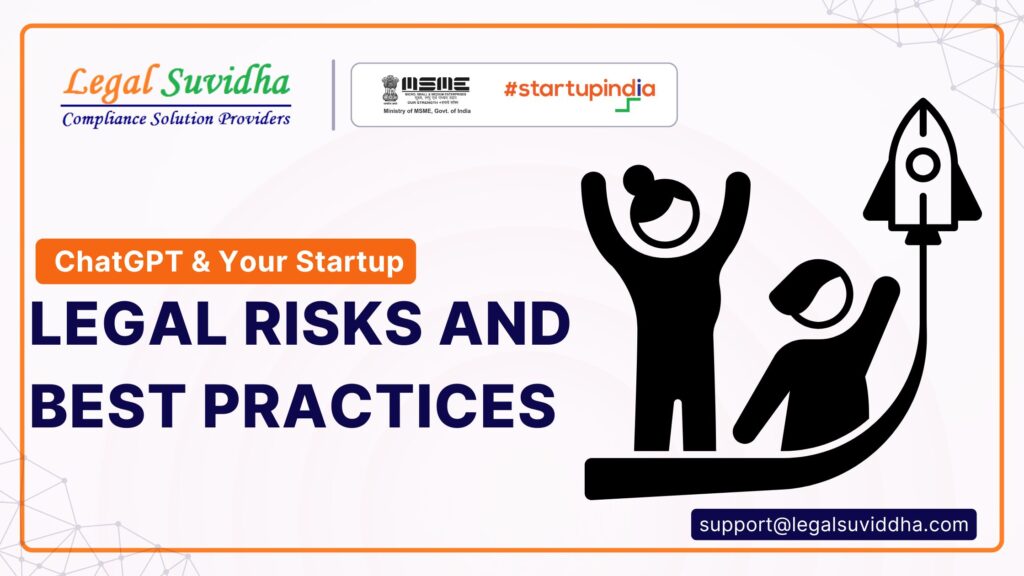ChatGPT & Your Startup: Legal Risks and Best Practices
The Tempting Shortcut: ChatGPT as Your Startup’s AI Co-founder
Let’s be honest building a startup is brutal. Funding is scarce, co-founders are juggling roles, and deadlines haunt you like ghosts. Then came ChatGPT.
Suddenly, your product descriptions, pitch decks, contracts, even your code snippets—everything became easier. No HR head? No problem, ChatGPT drafts your onboarding docs. No legal advisor? Just ask the bot.
It felt magical. Until it wasn’t.
What Happened with Rahul’s Pitch Deck
Rahul, a SaaS founder from Bengaluru, used ChatGPT to write his pitch deck before approaching investors. It was crisp, punchy, and visually appealing—he felt confident.
But one investor pulled out after a quick due diligence. Why?
The Terms of Use in his deck were copied from another company’s IP policy verbatim. Worse? The financial forecast section had confidential template data embedded in it, sourced unknowingly via ChatGPT.
What Rahul thought was help, turned into a legal red flag.
The Bigger Legal Picture: You’re at Risk Without Knowing
ChatGPT & your startup may seem like a perfect match, but here’s what’s really happening under the hood:
IP Ownership Issues: Content generated by ChatGPT isn’t automatically owned by your startup. You might not have full rights to reuse it commercially.
Confidentiality Breaches: Inputting sensitive info into ChatGPT could violate your NDAs and expose confidential client data.
Compliance Gaps: GDPR, DPDP Bill, or HIPAA—ChatGPT doesn’t ensure your compliance. If your content involves user data, you’re in risky territory.
Employment Law: Relying on AI for job descriptions or contracts without legal vetting could create loopholes that cost you later in court.
The worst part? Most founders don’t know they’re breaking laws until it’s too late.
The Magic Fix Legal Best Practices You Can Actually Apply
You don’t need to abandon ChatGPT. You just need to use it legally and smartly:
✅ Use ChatGPT for Drafts, Not Final Docs – Always run legal content past a human lawyer.
✅ Avoid Uploading Sensitive Data – Never feed user info, trade secrets, or unreleased code into ChatGPT.
✅ Tag All Outputs for Review – Mark AI-generated content for a compliance check before publishing.
✅ Review Platform’s T&Cs – Ensure you understand OpenAI’s usage policy, especially if you’re embedding it into your product.
✅ Set Internal Policies – Create an AI Use SOP for your team, defining what ChatGPT can and cannot be used for.
It’s not about stopping AI—it’s about controlling it.
5. The Ultimate Legal Shield: A Startup’s AI Usage Policy
Every startup today should have a documented AI Usage Policy—a legal document that outlines how your team is allowed to use tools like ChatGPT.
Think of it as your legal firewall.
Here’s what it should include:
Who is allowed to use AI tools and for what tasks
What kind of data can be input
Mandatory human review checkpoints
Copyright handling and licensing clauses
Penalties for misuse or leakage
We helped one of our fintech clients draft a policy like this—and it saved them during a funding round when their investor asked: “How do you manage AI compliance?”
Having the answer ready earned them instant credibility.
6. What Should You Do Now?
You’ve now seen the hidden legal risks behind ChatGPT & your startup—and the path to fix them before they cost you funding, IP rights, or your reputation.
You have two options:
Option 1: Do nothing
hope it doesn’t backfire. Keep using AI without guardrails, exposing your startup to legal risks every day.
Option 2: Take 30 minutes today.
Talk to a legal expert at Legal Suvidha and get your AI usage policy and contracts reviewed. It’s a small step that could save your entire business from collapse.
⏳ Urgency Alert: With VCs now including AI risk compliance in their diligence list, you can’t afford to wait. Book your legal review now before your next investor call.
Connect with our Domain Expert or reach out via WhatsApp for instant help.
Phone: 8130645164
Email: [email protected]
Website: www.legalsuvidha.com
Co-Founder Agreement Essentials
Startup Compliance Checklist 2025
IP Protection for Indian Startups










